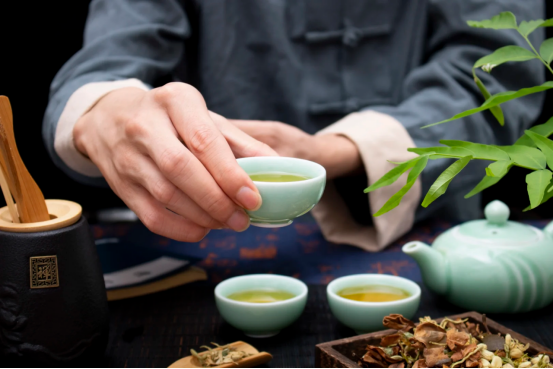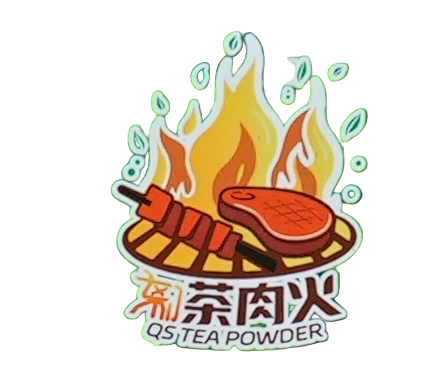Chongqing, a key tea-producing area in the Sichuan-Chongqing region, is known for its unique geography and climate, which nurture a wide variety of tea types. With a long history of tea culture, records of tea planting in Chongqing date back to the Tang Dynasty. Over centuries, the city developed its own tea-drinking traditions and tea art culture.
In the Ming and Qing Dynasties, Chongqing tea became an important trade product, transported across the country and even overseas via the Yangtze River. The city also became a crucial stop on the "Tea Horse Road." The excellent taste and craftsmanship of Chongqing tea earned it great market popularity, cementing its role in the history of Chinese tea culture.
Today, Chongqing’s tea culture remains lively. Traditional tea houses, tea garden tours, and tea-themed events attract many visitors, making tea a unique cultural symbol of this mountain city.
I. The Charm of "Bashan Night Rain" and Tea
The mountains and rivers of Chongqing, combined with its tea, create a poetic and picturesque charm. The city's hilly and rainy environment not only gives it unique beauty but also provides excellent conditions for tea cultivation. With abundant rainfall and a perfect balance of temperature and humidity, Chongqing produces tea that is rich in aroma and smooth in taste, making it a favorite among tea lovers.
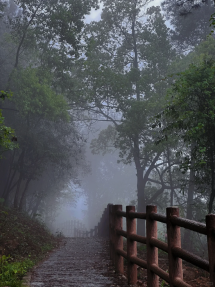
In the misty scenes of "Bashan Night Rain," a pot of hot tea is more than just a treat for the taste buds—it’s a comfort to the soul. Savoring a sip of tea feels like touching the moist air of the mountain city and the weight of time. It captures the deep cultural heritage and unique essence of Chongqing, shaped by history and nature alike.
II. Chongqing Teahouses: A Blend of Daily Life and Culture
Chongqing’s teahouse culture is a perfect mix of everyday life and human connection, symbolizing the city’s unique character. Strolling through old streets like Ciqikou and Shibati, you’ll find traditional teahouses filled with a lively and authentic atmosphere. Bamboo chairs, brick floors, and covered tea bowls are not just nostalgic elements but also windows into the life and memories of this mountain city. Inside, the buzz of conversation and the aroma of hot tea create a lively yet comforting vibe as people share stories and enjoy their tea.
Along the Jialing River or at popular spots like Hongya Cave, modern tea lounges offer a different kind of experience. These venues blend traditional tea culture with contemporary design, providing visitors with a refreshing and stylish atmosphere. Whether savoring delicate tea snacks or admiring river views, these modern teahouses show the innovation and evolution of Chongqing’s tea culture.
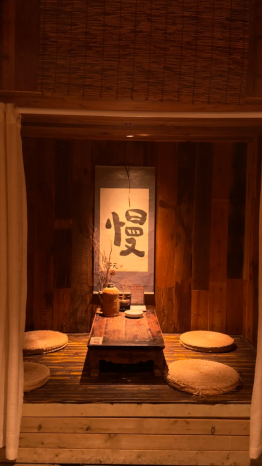
Meanwhile, the open-air tea stalls, known as baba tea stands, reflect the daily life of Chongqing’s people. At these casual setups, locals bask in the sun, sip tea, and play cards, enjoying a laid-back day. This humble yet vibrant tradition paints a picture of everyday happiness, showcasing the deep connection between tea culture and the rhythm of life in this city.
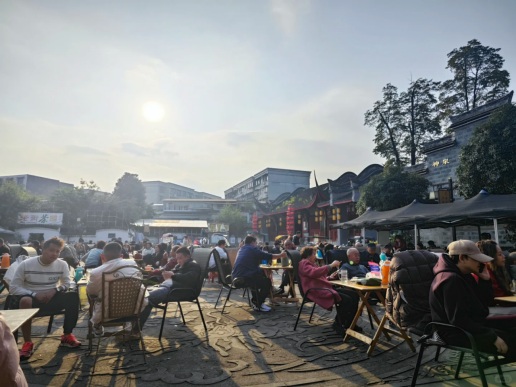
III. Tea and Hotpot: A Cultural Collision
Chongqing hotpot, known for its spicy, numbing, and savory flavors, has won over countless food lovers. Meanwhile, the city’s tea, with its refreshing and soothing qualities, adds a cool balance to the fiery dining experience. This contrast, sharp yet complementary, perfectly showcases the unique charm of Chongqing’s food culture.
In Chongqing, it’s a natural habit to enjoy a pot of covered-bowl tea after a hotpot meal. While the heat and richness of the hotpot are satisfying, they also bring an overwhelming warmth and oiliness. A sip of tea quickly cools you down, clears the palate, and neutralizes the spiciness, leaving a lingering sweet aftertaste. Whether at a bustling hotpot restaurant or hosting friends and family at home, drinking tea after hotpot has become a ritual for Chongqing people. This pairing of tea and hotpot is more than just a taste balance—it reflects the city’s warmth and its relaxed approach to life.
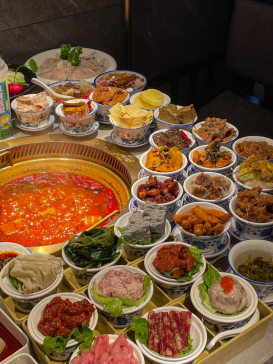
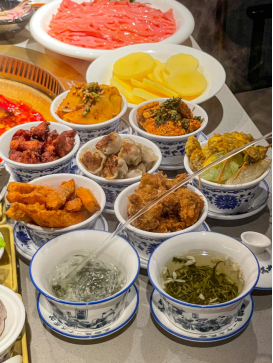
IV. Tea Tourism in Chongqing
-
Yongchuan Xiuya Tea Plantation
Yongchuan is a renowned green tea-producing region in Chongqing, famous for its “Yongchuan Xiuya.” Nestled among lush mountains, the tea plantation offers a peaceful retreat perfect for tea enthusiasts. Visitors can experience hands-on tea picking and learn traditional tea-making processes. Enjoying freshly made Yongchuan Xiuya, with its distinctive freshness and sweetness, is an unforgettable experience.
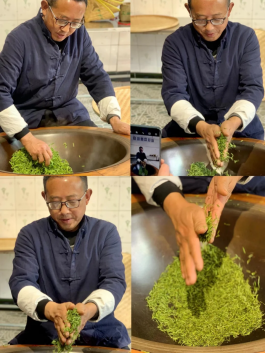
-
Banan Dong Hot Spring Tea Valley
Dong Hot Spring Tea Valley uniquely combines tea culture with hot spring wellness. Centered around an eco-friendly tea plantation, it provides a relaxing experience that blends tea therapy with soothing hot springs. Visitors can unwind in the warm waters while sipping authentic Chongqing green tea, finding tranquility and comfort in the harmony of warmth and tea aroma.
-
Fuling Wujiang Tea Region Located along the Wujiang River, Fuling is the birthplace of Chongqing’s signature black tea. The picturesque tea fields blend beautifully with the winding river scenery. The local black tea is known for its bright red hue and rich flavor, making it a favorite among tea lovers. Visitors can savor authentic Fuling black tea while admiring the breathtaking views of the Wujiang River, where tea and nature come together seamlessly.
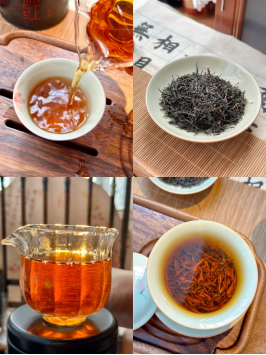
Chongqing’s tea tourism offers more than just the pleasure of tasting fine teas—it’s an immersive journey into the natural beauty and cultural essence of the city.
V. Tea Festivals and Events
1. Chongqing International Tea Culture Festival is a grand annual event for tea enthusiasts and industry professionals. It attracts tea merchants and tea masters from across the country and beyond. The festival showcases Chongqing’s local tea specialties, such as Yongchuan Xiuya and Fuling Black Tea, while offering diverse activities like tea art performances, tea culture lectures, and tea trade exhibitions. This event not only celebrates Chongqing’s tea heritage but also boosts the city’s tea industry presence in the national market.
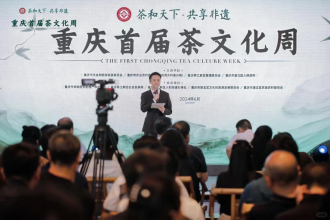

2. Community Tea Tasting Competition is a beloved event for its vibrant tea culture atmosphere and relaxed social setting. Tea lovers gather to taste and evaluate teas from various regions and types, sharing brewing techniques and tasting experiences. This inclusive activity provides joy for tea enthusiasts of all levels while fostering the growth and exchange of tea culture.
These festivals and events elevate Chongqing’s tea culture beyond daily life, making it a cultural emblem of the city that draws attention from tea lovers around the world.
VI. The Charm of Chongqing in the Aroma of Tea
Tea is the soul of Chongqing’s culture, weaving through its history, nature, and daily life. Whether listening to storytelling in an old teahouse in Ciqikou, savoring green tea in the tea gardens along the Wujiang River, or enjoying the lively atmosphere of a street-side tea stall, a cup of tea invites you to pause and immerse yourself in the unique charm of this mountain city. The aroma of Chongqing’s tea carries memories of the past and a love for life, serving as a bond that connects people and their stories.
Visiting Chongqing, tea tasting is more than a culinary experience—it’s a journey into the city’s culture and soul. Every cup of tea here waits patiently for someone who truly understands it.
